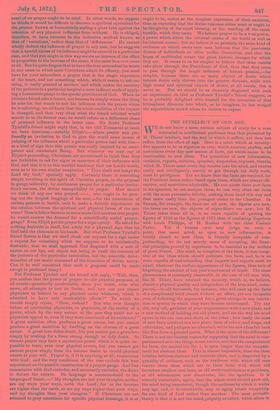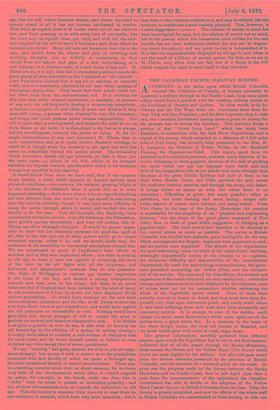THE INTFLLECT OF OLD AGE.
WE do not know a more carious subject of study for a man interested in intellectual problems than that presented by M. Thiers' intellect, and the way in which it suffers, yet does not suffer, from the effect of age. Here is a mind which at seventy- five appears to be as vigorous as ever, which receives, studies, and assimilates every day new masses of facts, yet which seems to be inaccessible to new ideas. The quantities of new information, statistics, reports, motions, speeches, despatches, requests, threats, which M. Thiers must every day receive into his mind, and receive easily and intelligently, merely to get through his daily work, must be prodigious. Yet we know that the facts are received, for the President issues orders based upon them, which are always effi- cacious, and sometimes admirable. He can quote these new facts in his speeches, he can analyse them, he can very often use them with the most persuasive felicity, making them bend this way and that more easily than the youngest orator in the Chamber. In finance, for example, the facts are all new, the figures are new, the taxes are new, the objects of expenditure are new ; but M. Thiers takes them all in, is no more capable of quoting the figures of 1842 as the figures of 1872 than of confusing Napoleon with Louis Philippe, or M. Rouher with the elder Casimir Perier. Yet if human eyes may judge on such a point, this same mind, so open to new information, is totally closed to new ideas, is literally incapable of com- prehending, we do not merely mean of accepting, the finan- cial principles proved by experience to be essential to the welfare of great States. His mind, so receptive of the facts, is non-recep- tive of the ideas which should correlate the facts, and he is no more capable of understanding that imports and exports must be equal, whatever the surface appearance of the figures, than he is of forgetting the amount of last year's movement of trade. The same phenomenon is constantly observable in the case of old men who, like M. Thiers, have retained the memory, which is, we believe, almost a physical quality and independent of the true mind, unim- paired,—in old barristers, for instance, who will suck up the facts of a complicated brief almost without an effort, yet are incapable even of following the argument for a great change in any institu- tion or system to which they have become accustomed. Try any old, very old, gardener of your acquaintance with a new plant, and a new method of bedding out old plants, and see the way his mind opens in the one case and shuts in the other ; how easily the mass of new facts involved in a new plant, facts of colour, and shape, and cultivation, and pedigree are absorbed, while the new ideas fall back like flies from a painted peach. What is the cause of the difference? There is not the faintest reason for supposing that the mind is com- partmented as to the things it can receive, and that the compartment for facts, the mental bin No. 1, is open longer than the compart- ment for abstract ideas. That is almost impossible, from the close relation between abstract and concrete ideas, and is disproved by a quantity of evidence, such as the readiness with which ola men receive those ideas which are to them facts, with which old barristers swallow new laws, or old mathematicians new problem; or old astronomers new discoveries, like the spectrum. It is scarcely conceivable, again, that the whole mind should grow old, the mind being immaterial, though the mediums by which it works may age, and, it is conceivable, may in aging retain receptivity for one kind of food rather than another. The most probable theory is that it is not the mind, properly so called, which alters in age, but the will, which becomes weaker, and allows the mind to remain closed to all it has not become habituated to receive. That habit as regards facts is of course never out of use while we live, new facts pressing on us with every turn of our heads ; but the mind may, as regards ideas, get rusty and stiff, till the exer- tion required of the will to move it becomes a pain from which we instinctively shrink. Many old men are conscious that this is the case, and shrink from the labour and pain of receiving new vivifying thoughts just as wilfully or consciously as they shrink from the labour and pain of a new undertaking, or a new journey, or in extreme cases, of a new doing of any sort. M. Thiers avows, it is said, that this is his mental position towards the great group of ideas described on the Continent as " the Church " ; Lord Palmerston allowed that it was his in relation to scientific truth, and it is constantly admitted by old men when speakng of theological speculations. They know that their minds could act, but draw back from the unaccustomed toil. It is evidence for this view that under unusual excitement, or necessity, or pressure of any sort, the old frequently develop a momentary receptivity, or become as receptive of new ideas of some one kind as if they were still young, a process often observed in very old statesmen, and kings, and other persons under intense responsibility. The will in such cases is reinvigorated, and compels the mind to act, as from disuse or old habit it is disinclined to do, but as it always, but for unwillingness, retained the power of doing. If, for ex- ample, circumstances of any sort convinced M. Thiers that he must. comprehend and, so to speak, receive Bastiat's writings, he could do it, though when the necessity is not upon him that feat seems so completely beyond his mental power. The irritability which sometimes marks old age proceeds, we take it, from just the Same cause,—a failure in the will, which in its strength restrains the impulse towards querulousness which in its weakness becomes so manifest to the observer.
It would follow from what we have said, that if the memory keeps perfect, a point which appears to depend entirely upon physical conditions,—the memory, for instance, growing bright as to the incidents of childhood when it grows dull as to what happened yesterday,—there is no reason why, as regards anything but new abstract ideas, the mind in old age should be less strong than the mind in maturity, though it may have more difficulty in using the media through which it works, and we find this con- stantly to be the case. Very old Generals, like Radetzky, have commanded victorious armies; very old statesmen, like Palmerston, have guided parties successfully ; and very old orators, like M. Thiers, are often strangely eloquent. It would be almost impos- sible to show that for oratorical purposes his mind has aged at all, that he has lost any one of those powers which go to create oratorical success, unless it be, and wo should doubt that, the acuteness of his sensibility to the mental atmosphere around him. We are accustomed to speak of Lyndhurst's later efforts as wonders, and so they were as physical efforts ; but there is nothing in old age to make a man less capable of reviewing the facts of the year by his old lights with all the eloquence, and bitterness, and epigrammatic terseness that he ever possessed. The Duke of Wellington in extreme age became impervious to the ideas of his day, and showed a strong indisposition towards new men even in the Army ; but there is no proof whatever that if England had been invaded by the kind of army he was accustomed to defeat, he would not have displayed all his ancient generalship. He would have received all the new facts about numbers, equipment, and the like, as M. Thiers receives the new facts about revenue and expenditure, and would have applied the old principles as successfully as ever. Nothing would have gone from him except strength of will to compel the mind to perform an unusual and therefore disagreeable task. Von Moltke is as great a general as ever he was, is able even to develop his old knowledge by the addition of a system of railway strategy ; it is only when asked to consider a new scheme of discipline that his mind closes, and he shows himself unable to believe or even to follow any idea except that of severe punishment.
We say "nothing" had gone, because we wish to put our argu- ment strongly ; but we say it with a reserve as to the possibilities connected with that faculty of which we spoke a fortnight ago, the little-understood faculty of mental accumulation. There may be something material about that, as about memory, for we know very little of the circumstances which affect it—which suspend its action, for example, in the Greek, while the Jew, who is " older " than he, seems to possess an increasing quantity—and one of these circumstances may, as regards the individual, be old age. That the faculty is separate from memory is clear from its non-existence in animals, which have very keen memories ; but it
may have a very intimate relation to it, and may be subject, like the memory, to conditions almost entirely physical. That, however, is a mere suggestion en passant. The relation of matter to mind hits been investigated for ages, but the relation of matter not to mind, but to the powers which the immaterial mind utilises for its own benefit, has not been sufficiently studied for any one to dogma- tise about the subject, and our point to-day is independent of it. It is that the impenetrability displayed by old age to new ideas is not the result of a failure of mental power, for that, as we see in M. Thiers, very often does not fail, but of a decay in the will which compels the mind to exert itself in that direction.



































 Previous page
Previous page